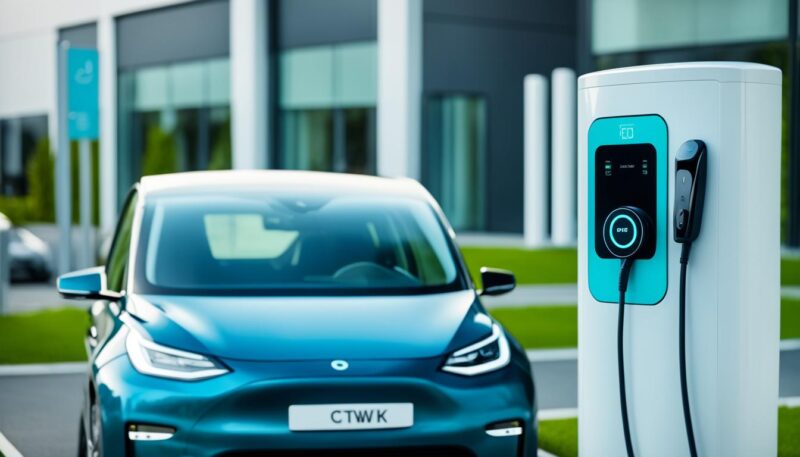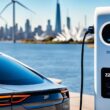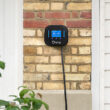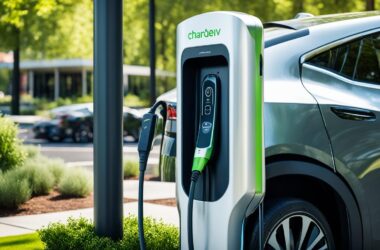Charging an electric car at home is a convenient and cost-saving option for EV owners. Installing a dedicated home charger is recommended for faster charging speeds and added safety features. The cost of installing a dedicated home charger can start from £798. Home chargers typically offer charging speeds of 3.6kW or 7kW, providing 15-30 miles of range per hour of charge. Choosing the right charging point compatible with your electric car’s connector type is important. Charging at home can be optimized by taking advantage of cheaper electricity rates during specific time periods and scheduling charging sessions accordingly.
Key Takeaways:
- Installing a dedicated home charger is recommended for faster charging speeds and added safety features.
- Home chargers typically offer charging speeds of 3.6kW or 7kW, providing 15-30 miles of range per hour of charge.
- Choosing the right charging point compatible with your electric car’s connector type is important.
- Taking advantage of cheaper electricity rates during specific time periods can optimize charging at home.
- Scheduling charging sessions accordingly can help save money on charging costs.
How to Charge an Electric Car at Home
To charge an electric car at home, a dedicated home charger is recommended. This charger is installed at the parking location of the electric car and offers faster charging speeds compared to using a standard 3 pin plug socket. The home charger is a weatherproof unit mounted on a wall with a connected charging cable or a socket for a portable charging cable. Qualified specialist installers can handle the installation process. Charging an electric car at home is similar to charging a mobile phone – it is recommended to plug in overnight and top up during the day.
Installation Process
The installation of a dedicated home charger is typically carried out by qualified specialists who ensure that the charging point is installed safely and in compliance with regulations. They assess the electrical infrastructure of the property, determine the optimal location for mounting the charger, and connect it to the electricity supply. The process may involve minor electrical work, such as installing a dedicated circuit and potentially upgrading the electrical panel. Once the installation is complete, the charger is ready for use.
Charging Speed and Range
Home chargers typically offer charging speeds of 3.6 kW or 7 kW, depending on the model. The actual charging speed may vary depending on the electric car’s onboard charger. Charging at 7 kW can provide around 15-30 miles of range per hour of charge, allowing for convenient overnight charging and ensuring a fully charged battery in the morning.
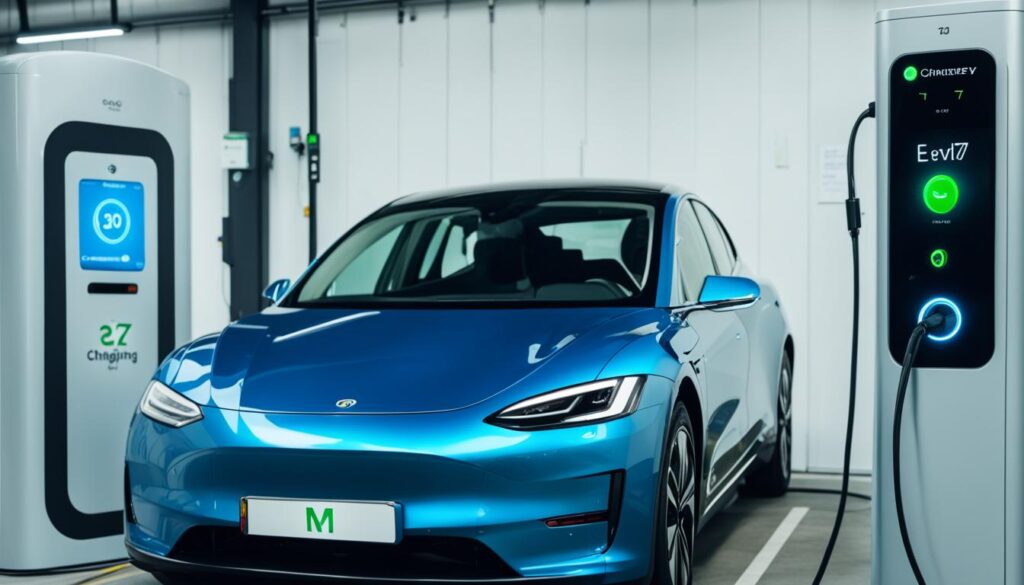
Benefits of Home Charging
Charging an electric car at home offers several benefits. Firstly, it provides convenience and flexibility as you can charge your vehicle at any time without the need to visit public charging stations. Secondly, home charging allows you to take advantage of cheaper electricity rates during off-peak hours, helping to reduce charging costs. Additionally, a dedicated home charger provides faster charging speeds than a standard 3 pin plug socket, allowing you to top up your vehicle’s battery more efficiently. Lastly, home charging ensures that your electric car is always ready for use, eliminating the need to rely on public charging infrastructure.
| Benefits of Home Charging | Details |
|---|---|
| Convenience | Charge your vehicle at any time from the comfort of your home |
| Cost Savings | Take advantage of cheaper electricity rates during off-peak hours and reduce charging costs |
| Faster Charging | Dedicated home chargers offer faster charging speeds compared to standard plug sockets |
| Always Ready | Ensure that your electric car is fully charged and ready for use |
Cost of Installing a Dedicated Home Charger
When it comes to installing a dedicated home charger for your electric vehicle, the cost can vary depending on your specific installation requirements. On average, the cost starts from £798, but additional expenses may arise if you need extra electrical work or modifications.
Once the installation is complete, you’ll only pay for the electricity you use to charge your vehicle. In the United Kingdom, the average electricity rate is around 28p per kilowatt-hour (kWh). However, as an EV owner, you have the opportunity to switch to an electricity tariff designed specifically for EV drivers, which could significantly reduce your charging costs. With some tariffs, you could enjoy rates as low as 8.49p per kWh, resulting in substantial savings over time.
Charging your electric car at home not only provides you with the convenience of always having a fully charged vehicle, but it can also be more cost-effective compared to using public charging stations. By taking advantage of a dedicated home charger and optimizing your energy usage, you can save money and have peace of mind knowing that your vehicle is ready to go when you need it.
Cost Breakdown:
| Expense | Cost |
|---|---|
| Dedicated home charger installation | Starts from £798 |
| Additional electrical work or modifications | Varies |
| Average electricity rate (per kWh) | 28p |
| Electricity tariff for EV drivers | As low as 8.49p |
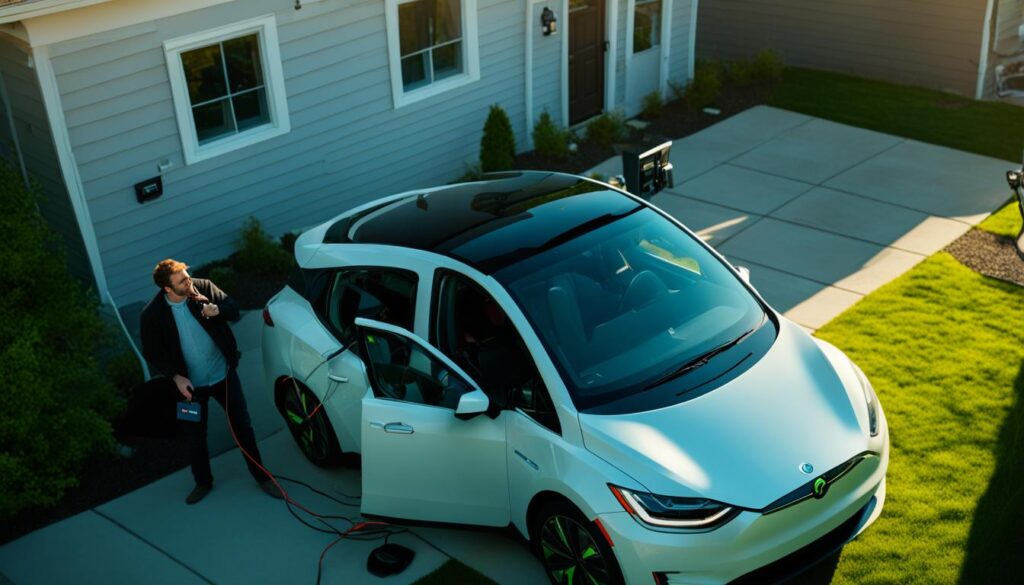
I know that investing in a dedicated home charger may seem daunting at first, but the long-term cost savings and convenience it offers are well worth it. Plus, with the option to switch to an electricity tariff designed for EV drivers, you can further reduce your charging expenses. Remember, charging your electric car at home is not only practical but also cost-effective for a seamless driving experience.
How Fast Can You Charge an Electric Car at Home
The charging speed of electric cars at home is measured in kilowatts (kW). Home chargers can provide charging speeds of 3.6kW or 7kW, offering around 15-30 miles of range per hour of charge. The actual charging speed may be limited by the onboard charger of the electric car.
If the car allows up to 3.6kW charging rate, using a 7kW charger will not damage the vehicle. It’s important to note that most domestic properties in the UK have single-phase power, limiting the maximum charging rate to 7kW.
Optimizing Charging Times
- Choose a home charger with the maximum charging speed your electric car can handle.
- Consider upgrading the onboard charger of your vehicle if it allows for faster charging speeds.
- Plan your charging sessions in advance to take advantage of off-peak electricity rates.
- Install a smart charger that can optimize charging based on time of use tariffs and electricity prices.
How to Optimize Charging at Home
Maximizing the efficiency of charging at home can be achieved through smart scheduling and optimizing electricity usage. By taking advantage of time-of-use electricity tariffs and scheduling the charging sessions to align with cheaper periods, EV owners can save money on their charging costs. Additionally, smart home chargers can provide valuable insights into home and EV energy usage, empowering users to make informed decisions about their charging expenses.
One of the key benefits of optimizing charging at home is the ability to take advantage of off-peak hours when electricity rates are typically lower. By scheduling charging sessions during these periods, EV owners can significantly reduce their charging costs. For example, many electricity providers offer cheaper rates during nighttime hours when the demand for electricity is lower. Charging your electric vehicle overnight not only ensures a fully charged battery each morning but also allows you to benefit from these cheap nighttime electricity rates.
In addition to choosing the right time to charge, smart home chargers play a crucial role in optimizing charging at home. These chargers offer advanced features such as smart scheduling and load management, allowing you to customize and control your charging sessions. For example, you can program the charger to start charging at a specific time or delay charging until the electricity rates become more affordable.
Furthermore, smart home chargers provide detailed information about your home and EV energy usage. They allow you to monitor the amount of energy consumed during each charging session, giving you insights into how much you are spending on charging your electric vehicle. Armed with this data, you can make informed decisions about your energy usage and switch to cheaper tariffs or adjust your charging behavior to maximize cost savings.
Ultimately, optimizing charging at home with smart scheduling and smart home chargers not only saves you money but also reduces the environmental impact of your electric vehicle. By utilizing time-saving charging solutions and taking advantage of cheaper electricity rates, you can enjoy the convenience of charging at home while minimizing costs and maximizing efficiency.
Benefits of Optimizing Charging at Home:
| Benefits | Description |
|---|---|
| Cost Savings | By scheduling charging sessions during off-peak hours and monitoring energy usage, EV owners can significantly reduce their charging costs. |
| Convenience | Charging at home allows you to easily maintain a fully charged battery each morning without the need to visit public charging stations. |
| Environmental Impact | Optimizing charging at home reduces reliance on fossil fuels and promotes the use of renewable energy sources, minimizing the carbon footprint of EV owners. |
| Flexibility | Smart home chargers provide customizable charging options, allowing EV owners to adjust their charging sessions based on their specific needs and preferences. |
Conclusion
Charging an electric car at home with a 7kW EV charger is a convenient and cost-effective solution for EV owners. Installing a dedicated home charger allows for faster charging speeds and offers built-in safety features. By taking advantage of time-of-use electricity tariffs and smart scheduling for EV chargers, owners can optimize their charging sessions, save money on charging expenses, and maximize energy efficiency.
With the increasing popularity of electric vehicles, it is crucial to have reliable and energy-efficient EV chargers in place. The 7kW EV charger provides a balance between charging speed and cost-effectiveness, making it an ideal choice for residential use. By harnessing the power of smart scheduling, EV owners can take full advantage of cheaper electricity rates during off-peak hours and ensure a fully charged battery each morning without incurring high charging costs.
Optimizing charging at home not only benefits the wallet but also contributes to a greener and more sustainable future. By charging during periods of lower demand, homeowners can reduce the strain on the electrical grid and minimize their carbon footprint. Energy-efficient EV chargers combined with smart scheduling not only make EV ownership more convenient and affordable but also play a significant role in promoting a cleaner environment for all.





